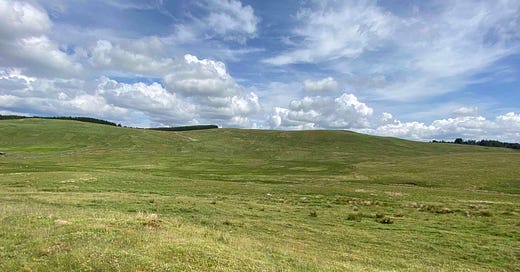Peter Carruthers
As I have just started writing a short series on climate change in preparation for an online Hope Countryside seminar (5 April 2025), I thought I would offer a note on my own history with the subject.
As for many scientists, what is now the ‘climate-change agenda’ had a considerable impact on my research career.
Starting in 1979, much of my research concerned renewable energy and industrial feedstocks from biomass. Along with other renewables, biomass energy research was driven or justified first by the oil crises of the 1970s and projections of future supplies of fossil fuels, and only later by what was then called ‘global warming’. In between, agricultural biofuels were seen as a constructive use of the farm surpluses arising from the CAP’s production subsidies.
Later, I worked on environmental life-cycle assessment. This methodology seeks to gauge accurately and compare the contribution of different products and processes to global warming and other environmental impacts.
In 1990/1991, I conducted early studies of the impacts of predicted climate change on farming, in the UK and in Africa.
In the early 2000s, I was the first Executive Director of the Christian environmental educational charity, John Ray Initiative (JRI). JRI was founded and chaired by the late Sir John Houghton, an eminent climate physicist, and at the time co-chair of the IPCC’s Scientific Assessment Working Group. One of JRI’s main aims, then and now, is to persuade Christians (especially evangelicals) of the seriousness of the ‘environmental crisis’ and advance the climate-change agenda among Christians.
In 2009, I contributed a chapter on land ethics to a multi-authored book entitled, ‘What is land for? The food, fuel and climate change debate’. In what turned out to be my last published contribution on the issue for some years, I concluded as follows.
Finally, the over-riding imperative regarding land is to do something and do it now! The question is: ‘what?’. Our present agenda is profoundly influenced by intense concern about the future, especially the future that, it is believed, will result from climate change. Our concern about climate change is, however, based on predictions; scientific, strongly evidenced and widely accepted predictions admittedly, but, nevertheless, predictions. And predictions can be wrong. The future does not send us any signals; we only have signals from the present about what we think might happen and, “beyond the short term, such signals are inherently unreliable”.1
The need … seems to be to build a deeper and wider robustness and resilience into land use and society that is capable of weathering not only the storm of climate change, but also other, as yet unforeseen, challenges. And the ethical viewpoints and visions reviewed here may help to reset some of the balance, to allow our decisions and actions to be shaped ultimately by an understanding of human identity and purpose and of our relationships with one another and with land and nature.
As good as any expressions of this sentiment are the thoughts on the future of Wendell Berry, to whom I give the last word. “We do not need to plan or devise a ‘world of the future’; if we take care of the world of the present, the future will have received full justice from us. A good future is implicit in the soils, forests, grasslands, marshes, deserts, mountains, rivers, and oceans that we have now, and in the good things of human culture that we have now; the only valid ‘futurology’ available to us is to take care of those things. We have no need to contrive and dabble at ‘the future of the human race’; we have the same pressing need that we have always had - to love, care for, and teach our children”.2
Foster, J. 2008. The Sustainability Mirage. Illusion and Reality in the Coming War on Climate Change, p 15. Earthscan, London.
Berry, W. 2002. Feminism, the body, and the machine. In: Wirzba, N (Ed) The art of the commonplace. The agrarian essays of Wendell Berry, p 73. Shoemaker and Hoard, Washington DC.




